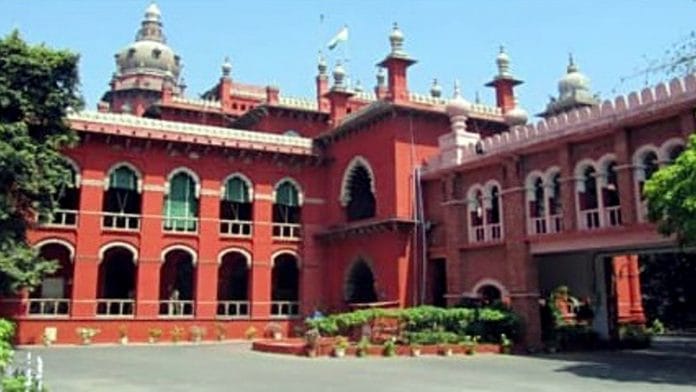New Delhi: The Madras High Court has mooted the idea of including the “duty to laugh” to the chapter of Fundamental Duties in the Constitution and to “mine” the “correlative right to be funny” under the Right to Freedom of Speech and Expression.
A single judge bench of Justice G.R. Swaminathan contemplated introduction of the new right and duty in his 17 December judgment — replete with humour and satire — that quashed a case against Communist Party of India (Marxist-Leninist) or CPI(ML) office bearer Mathivanan, who was booked under Indian Penal Code sections pertaining to ‘criminal conspiracy’, ‘waging war against the state’ and ‘criminal intimidation by conspiracy’, for a Facebook caption. Mathivanan had filed a petition with the court, seeking the dismissal of the FIR.
In the post, the 62-year-old leader posted family pictures from his trip in September to the Sirumalai Hills in Tamil Nadu. “A trip to Sirumalai for shooting practice,” wrote Mathivanan by way of a caption, in an attempt to be funny. The Vadipatti Police filed a suo motu FIR against the leader.
While spelling out in detail the four essential stages of a crime, Justice Swaminathan noted that the caption was intended to be funny and that the petitioner had no intention to wage war against the State.
Also read: Right to free speech is democracy’s precious gift, but not when it stifles others’ voices
‘Higher threshold’ needed
To make out his case to add a new right and duty to the Constitution, the judge, naming prominent humourists and cartoonists, said in his judgment: “Jug Suraiya, Bachi Karkaria, E.P. Unny and G. Sampath…if any one of them, or for that matter any satirist or cartoonist, had authored this judgment, the hypothetical author would have added one more fundamental duty — duty to laugh — to the list of Fundamental Duties.”
The court held that provisions that penalise ‘preparation’ (to commit a crime) must meet a “higher threshold”. It said that such a “higher threshold” was not met in the present case.
“Any reasonable and normal person coming across the Facebook post would have laughed it off,” Justice Swaminathan said.
Dismissing the State’s opposition to the petition, the bench quashed the FIR and termed it an abuse of the legal process.
In the order, Justice Swaminathan observed that the ‘duty to laugh’ may be added to Part IV-A of the Constitution, which provides for Fundamental Duties such as upholding the dignity and sovereignty of India.
The judge further observed that such a “right to be funny” may be “mined” under the Freedom of Speech and Expression provided by Article 19 (1) (a) of the Constitution.
The article provides that “all citizens shall have the right to freedom of speech and expression”. It is subject to “reasonable restrictions”, as provided under Article 19 (2). The provision has been interpreted in the past as a guarantee to rights such as “freedom of the press” and “right to information”.
‘One ultimate holy cow’
“Being funny is one thing, and poking fun at another is different altogether…. ‘Laugh at what?’ is a serious question,” Justice Swaminathan said in his judgment, taking note of the various limitations on free speech in India. He stated that humour is subjective and varies across people and regions.
In a series of analogies, the judge used the term ‘holy cow’ to denote topics off-limits for humour, mentioning how such no-go areas were different for everyone.
“All over India, there is one ultimate holy cow and that is national security,” the court observed.
The judge observed that Marx and Lenin are also beyond the bounds of criticism or satire in Kerala, and noted the immunity against satire that personalities such as Tagore, Shivaji, and Savarkar enjoy in West Bengal and Maharashtra.
“One dare…not poke fun at them,” Justice Swaminathan’s judgment noted.
The judge also took a dig at Marxist radicals, noting that “…revolutionaries, whether real or phoney, are not credited with any sense of humour,” adding that the post seemed to be the CPI (ML) leader’s “maiden attempt at humour”.
Disturbing tendency
The judge noted the disturbing tendency of the police to ask for remand in “every” criminal case and said the magistrate must satisfy herself of procedural requirements before granting the police such custody.
Appreciating the action of the judicial magistrate in Vadipatti in denying police remand in Mathivanan’s case, the court said the 62-year-old escaped incarceration by a “whisker”.
The observations on “right to be funny” come at a time when there is an increasing backlash against artistic freedom and comedy.
A few months back, Munawar Faruqui, a stand-up comic, spent over a month in jail for allegedly insulting ‘Hindu gods and goddesses’. Many of Faruqui’s shows have been cancelled in the last few months, owing to “threats of venue vandalism”.
(Akshat Jain, a first-year student of law at NLU, Delhi, is an intern with ThePrint)
(Edited by Saikat Niyogi)
Also read: This MP warned the Constitution didn’t give Indians freedom of speech. He’s been proven right.






